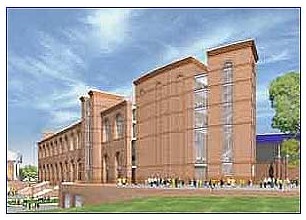Work is starting on the renovation of Michigan Stadium just in time for the feds to get involved.
Plans for the Big House, Michigan Stadium's nickname, call for a total of 500 new seats for a total capacity of 108,000. Among the new amenities are 83 luxury suites, 3,200 club seats, expanded restrooms and concession stands, along with a new stately brick façade on the structure's east and west sides.
 Construction is set to finish in time for the 2010 football season without interrupting any home games.
Construction is set to finish in time for the 2010 football season without interrupting any home games.
The $226-million project has created some uproar from fans and alumni who don't want to see luxury suites or club seats integrated into Michigan's traditionally egalitarian bench seating. Groups such as Save the Big House have risen up to fight the expansion plans, comparing them to ill-conceived halo around the stadium in the late 1990s that was eventually removed. A group of disabled veterans has also filed a lawsuit against the university, saying the stadium doesn't provide enough wheelchair seating.
The U.S. Department of Justice recently joined the lawsuit. Federal architects are inspecting the stadium to see if there are any violations of federal laws.
The university is cooperating yet pressing forward with the project, gearing up to begin demolition. University spokespeople say the changes will greatly enhance the experience for fans in one of college football's most sacred places. University officials point out that there will be wider aisles, more handrails, additional exit and entry points for improved crowd circulation, along with more handicapped seating. It will also upgrade the structure's utilities, mechanical and electrical systems.
However, the biggest difference will be in appearance. The 400,000-square-foot expansion includes two multi-story masonry structures on both the field's east and west sides. The level of the stadium bowl will stand 10 feet higher than the highest point of the current scoreboards. The new design will direct more crowd noise onto the field, too. There will also be two smaller buildings at the north and south end zones that house additional restrooms and concessions and support functions, such as first-aid, security and will-call.
Private donations and Athletic Department resources, primarily revenues generated by the new seating, will cover the renovation's $226-million price tag. Stephen M. Ross, one of the nation’s premier real estate developers, recently gave $5 million to the project through The Michigan Difference, the university’s $2.5 billion fundraising campaign.
Once the project is paid for, University officials expect Michigan Stadium's new seating to help fund facility upgrades and other costs of 25 men’s and women’s varsity sports.
Source: Diane Brown and Kelly Cunningham, spokeswomen for the University of Michigan
Writer: Jon Zemke
Enjoy this story?
Sign up for free solutions-based reporting in your inbox each week.